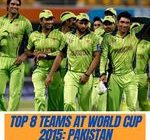Sometimes you can assess players by their statistics and over a career it is often a reasonable indicator of how good they actually are; especially in the longer formats where the better players tend to generate better looking numbers! But in the shorter form, even the 50 over odis, you need to factor in the impact they can have on the opposition and I had a bird’s eye view of that in Dhaka recently.
Bangladesh were playing Pakistan and should have had the game sewn up. The asking rate was daunting, over a hundred needed to be scored and there was a buzz around the field. You can normally see that in the way the fielders move between the overs, how they attack a ball etc. Then ShahidAfridi walked in.
Over a very long career, Afridi averages 23. His strike rate is greater than 100, which suggests that he can be destructive but also in short bursts. Bangladesh had enough in the bank to budget for a possible burst. And in any case, in recent times, he is a distinctly bowling all-rounder.
He hit the first two balls for six and even that shouldn’t surprise too many. But from my vantage point in the commentary box (I was actually calling the action) I could see the body language change. Suddenly, there was concern all around, the meetings grew, fielders were summoned and despatched and worry quickly took over confidence. From having the match wrapped up, Bangladesh were suddenly worried about how they could lose the match.
As it turns out, Afridi made 59 off 25 balls, he murdered the bowling and got FawadAlam at the other end, 1 six in his entire career, to hit a couple more and Bangladesh were overwhelmed. Once again for them, it was so near and yet so far.
It wasn’t just a man with a batting average of 23 who did them in, it was a man who could change the course of a match when in who did it.
Hence, in my view, the need for indices that measure impact. If we could find out what Afridi does to a match once he crosses a certain score, or when he plays a certain no of balls or better still, what his role in Pakistan wins has been, we might look at him numerically, the way we do qualitatively.




0 Comments